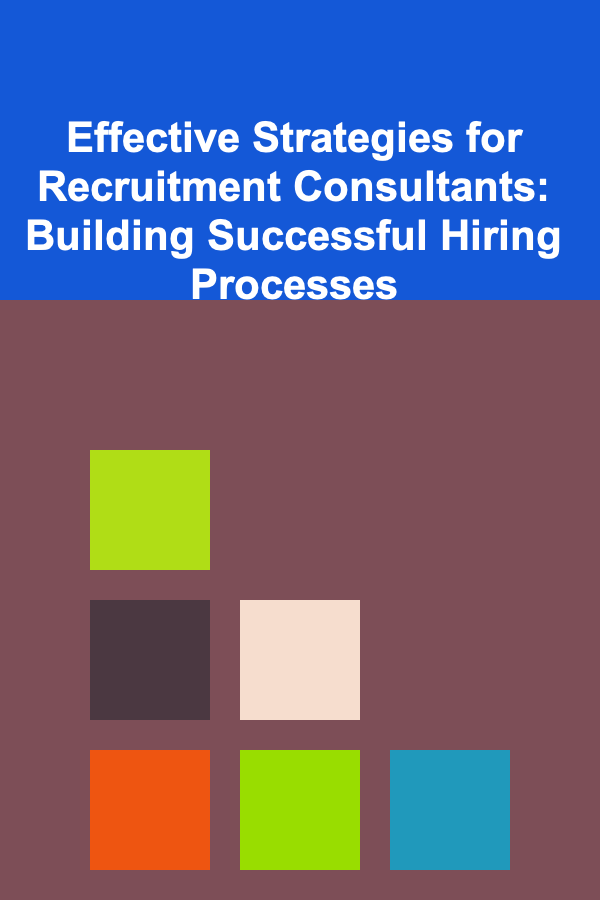
Effective Strategies for Recruitment Consultants: Building Successful Hiring Processes
ebook include PDF & Audio bundle (Micro Guide)
$12.99$9.99
Limited Time Offer! Order within the next:

In today's fast-paced job market, recruitment consultants play a vital role in bridging the gap between employers seeking the right talent and candidates searching for their ideal roles. However, to ensure success, recruitment consultants need to implement a series of well-thought-out strategies that go beyond the mere act of filling vacancies. Building an effective and successful hiring process requires both strategy and understanding, with a focus on delivering value to both the employer and the candidate.
In this article, we will explore actionable strategies recruitment consultants can use to optimize their hiring processes, helping them stay ahead of the competition while improving the experience for both clients and candidates.
Understand the Client's Business and Culture
Effective recruitment doesn't begin with just filling out job descriptions. The first step in building a successful hiring process is understanding your client's business inside and out. This deep knowledge is crucial in identifying candidates who are not only technically qualified but who also align with the company culture.
Key Steps:
- In-depth Client Meetings: Hold comprehensive meetings with clients to understand their business goals, values, and culture. Dig deeper than just job descriptions to understand the team dynamics, the challenges faced, and the traits that will make a candidate successful in the role.
- Identify Key Competencies: Determine the essential skills, experiences, and qualities that align with the company's mission. This could include both technical skills and soft skills such as communication, adaptability, and cultural fit.
- Ongoing Relationship Building: Establish an ongoing partnership with clients rather than one-time transactions. Building long-term relationships helps consultants become more attuned to the evolving needs of the company, improving the quality of the candidates they provide.
Refining the Candidate Sourcing Strategy
The foundation of any successful recruitment process is a well-thought-out candidate sourcing strategy. Recruitment consultants should be proficient in using a range of tools to find the right candidates and broaden their talent pool.
Key Steps:
- Leverage Multiple Channels: Use various platforms to source candidates, including job boards, social media networks (such as LinkedIn), and niche industry-specific websites. Don't forget to tap into your own network for passive candidates who might not be actively looking for new opportunities.
- Engage in Proactive Talent Pipelining: Instead of waiting for positions to open, proactively build a talent pipeline by engaging with potential candidates on a regular basis. Keeping a roster of potential candidates ready for future opportunities can shorten the time-to-hire.
- Use Recruitment Marketing: Position your clients as attractive employers by showcasing their brand on social media and job boards. This can include highlighting company culture, benefits, and career growth opportunities, which can help attract top-tier talent.
- Employee Referrals: Encourage clients to create employee referral programs, which can be a great source of qualified candidates. Employee referrals tend to be a reliable way to find candidates who align with the company culture and values.
Streamline the Screening Process
The screening phase of the recruitment process is crucial to ensure that only qualified and suitable candidates are moved forward. However, an overly complicated or lengthy process can deter top talent. Recruitment consultants need to balance efficiency with thoroughness.
Key Steps:
- Use Pre-screening Tools: Implement software or tools that help streamline the pre-screening process, such as automated questionnaires or skill assessments. These tools can quickly filter out candidates who don't meet the minimum requirements, saving time.
- Behavioral Interviews: Implement behavioral interview techniques to assess a candidate's past performance and predict future success. This helps reveal how candidates have responded to challenges in previous roles and whether they can adapt to the client's work environment.
- Cultural Fit Assessment: Beyond the resume and interview, assess whether candidates align with the company's culture and values. Consider personality tests or cultural fit questionnaires that help evaluate how well a candidate will integrate into the team.
- Talent Pool Database: Keep a well-organized, searchable database of previously interviewed candidates. This database can be an invaluable resource when new roles open up and can dramatically speed up the screening process.
Effective Communication with Candidates
Maintaining clear and consistent communication throughout the recruitment process is essential for keeping candidates engaged and informed. Poor communication can result in candidates dropping out of the process or accepting offers from other employers.
Key Steps:
- Set Clear Expectations: At the start of the process, set clear expectations with candidates regarding the timeline, the steps involved, and what is required from them. This helps them prepare for each stage and ensures they are not left wondering about their status.
- Regular Updates: Keep candidates informed throughout the hiring process. Regular updates on the status of their application, feedback from interviews, and next steps help maintain their interest and enthusiasm.
- Transparent Feedback: If a candidate is not selected, provide constructive feedback where possible. This not only helps candidates improve but also strengthens your relationship with them, as they will see that you value their time and effort.
- Personalized Communication: Avoid generic emails. Take the time to personalize messages to candidates to make them feel valued. This small detail can enhance the candidate experience and reinforce your reputation as a recruiter who genuinely cares about their journey.
Enhance the Interview Process
The interview process is one of the most critical stages in recruitment. A well-executed interview process helps identify the best fit for the role while leaving a positive impression on candidates. Recruitment consultants should help clients design and optimize their interview processes to ensure a smooth experience for all involved.
Key Steps:
- Structured Interviews: Encourage clients to implement structured interviews, where each candidate is asked the same set of questions. This reduces bias and ensures that candidates are evaluated consistently based on their abilities and qualifications.
- Panel Interviews: For more senior or specialized roles, involve multiple interviewers in the process. This allows for diverse perspectives and ensures that candidates are evaluated from different angles, including technical skills, personality fit, and problem-solving capabilities.
- Assess Soft Skills: It's easy to focus on technical qualifications, but soft skills such as teamwork, adaptability, and leadership are equally important. Consider role-playing exercises, situational judgment tests, or group interviews to assess these traits.
- Candidate Experience: Ensure that the interview process itself reflects the company's values. Create a welcoming, respectful, and engaging atmosphere. This can have a lasting impact on a candidate's perception of the company, whether they receive an offer or not.
Make the Offer and Onboard Seamlessly
Once you've identified the best candidate, it's time to make the offer. However, this step can be delicate. A poorly handled offer can lead to candidates rejecting the position or accepting another offer.
Key Steps:
- Negotiate Smartly: Work with the client to ensure that the salary and benefits package is competitive, and be transparent with the candidate about the negotiation process. Ensure that expectations are aligned early on to avoid misunderstandings.
- Smooth Onboarding: The hiring process doesn't end with the offer. Successful onboarding is crucial to ensuring the candidate's long-term success. Help clients develop an onboarding process that integrates new hires into the company culture, provides the training they need, and sets them up for success.
- Follow-Up: After the candidate starts their new role, check in periodically to ensure everything is going smoothly. This demonstrates your commitment to both the client and the candidate and helps foster a positive, long-term relationship.
Continuous Improvement and Adaptation
The recruitment landscape is always evolving. To remain competitive, recruitment consultants must continuously evaluate and refine their processes.
Key Steps:
- Analyze Metrics: Collect data on key metrics such as time-to-hire, cost-per-hire, candidate quality, and client satisfaction. Analyzing this data can reveal areas for improvement and help consultants optimize their strategies.
- Stay Informed: The recruitment field is constantly evolving. Stay up to date with the latest trends in hiring, from new technology and sourcing tools to shifts in candidate expectations. This will allow you to offer cutting-edge solutions to your clients.
- Solicit Feedback: After the hiring process, seek feedback from both clients and candidates. This feedback can provide valuable insights that help you fine-tune your approach and ensure a better experience next time.
Conclusion
Building a successful hiring process is not a one-size-fits-all approach. Recruitment consultants need to understand their clients' unique needs, leverage multiple sourcing strategies, ensure effective communication, and continuously refine their processes. By focusing on these actionable strategies, recruitment consultants can create more efficient, effective, and positive experiences for both clients and candidates, ultimately leading to better hiring outcomes and stronger, longer-lasting relationships.
Reading More From Our Other Websites
- [Home Space Saving 101] How to Store Appliances Efficiently: Tips and Tricks
- [Organization Tip 101] The Essentials of a Minimalist Home Office Setup
- [Home Staging 101] How to Stage a Home to Highlight Natural Light and Open Spaces
- [Organization Tip 101] Common Mistakes to Avoid When Using a Nail Gun for Trim Projects
- [Screen Printing Tip 101] Choosing the Right Screen Printing Ink: A Beginner's Guide
- [Home Budget Decorating 101] How to Update Your Home Decor with DIY Projects
- [Personal Care Tips 101] How to Choose a Vegan Lip Gloss for a Cruelty-Free Beauty Routine
- [Home Budget Decorating 101] How to Transform Thrift Store Finds with Spray Paint: A Beginner's Guide to Budget Decor
- [Personal Care Tips 101] How to Maintain Personal Hygiene in a Busy Schedule
- [Organization Tip 101] How to Prepare Your Home for Seasonal Allergies with Smart Organizing

How to Create a Family Storytelling Tradition
Read More
How to Negotiate Better Rates on Your Home Services
Read More
How to Protect Your Rental Property from Fraudulent Tenants
Read More
How to Set Up a Home Budget for Digital Subscriptions and Services
Read More
How To Photograph Birds in Flight
Read More
How to Test and Calibrate Electrical Meters Like a Pro
Read MoreOther Products

How to Create a Family Storytelling Tradition
Read More
How to Negotiate Better Rates on Your Home Services
Read More
How to Protect Your Rental Property from Fraudulent Tenants
Read More
How to Set Up a Home Budget for Digital Subscriptions and Services
Read More
How To Photograph Birds in Flight
Read More